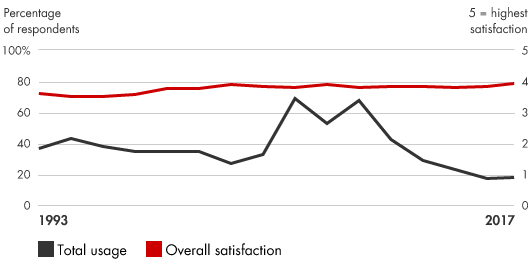Management Tools
Scenario Planning allows executives to explore and prepare for several alternative futures. It examines the outcomes a company might expect under a variety of operating strategies and economic conditions. Contingency Planning assesses what effect sudden market changes or business disruptions might have on a company and devises strategies to deal with them. Scenario and contingency plans avoid the dangers of simplistic, one-dimensional or linear thinking. By raising and testing various “what-if” scenarios, managers can brainstorm together and challenge their assumptions in a nonthreatening, hypothetical environment before they decide on a certain course of action. Scenario and Contingency Planning allows management to pressure-test plans and forecasts, and equips the company to handle the unexpected.
Usage and satisfaction among survey respondents

How Scenario and Contingency Planning works:
Key steps in a Scenario and Contingency Planning process are:
- Choose a time frame to explore
- Identify the current assumptions and thought processes of key decision makers
- Create varied, yet plausible, scenarios
- Test the impact of key variables in each scenario
- Develop action plans based on either the most promising solutions or the most desirable outcome the company seeks
- Monitor events as they unfold to test the company’s strategic direction
- Be prepared to change course if necessary
| RELATED TOPICS | HOW BAIN CAN HELP |
|---|---|
|
Companies use Scenario and Contingency Planning to:
- Achieve a higher degree of organizational learning
- Raise and challenge both implicit and widely held beliefs and assumptions about the business and its strategic direction
- Identify key levers that can influence the company’s future course
- Turn long-range planning into a vital, shared experience
- Develop a clearer view of the future
- Incorporate globalization and change management into strategic analysis
Selected references
Bazerman, Max H., and Michael D. Watkins. Predictable Surprises: The Disasters You Should Have Seen Coming, and How to Prevent Them. Harvard Business School Press, 2004.
Bood, Robert, and Theo Postma. “Strategic Learning with Scenarios.” European Management Journal, December 1997, pp. 633–647.
Elkins, Debra, Robert B. Handfield, Jennifer Blackhurst, and Christopher W. Craighead. “18 Ways to Guard Against Disruption.” Supply Chain Management Review, January 1, 2005, pp. 46–53.
Fahey, Liam, and Robert M. Randall, eds. Learning from the Future: Competitive Foresight Scenarios. John Wiley & Sons, 1997.
Fuld, Leonard. “Be Prepared.” Harvard Business Review, November 2003, pp. 20–21.
Lindgren, Mats, and Hans Bandhold. Scenario Planning: The Link Between Future and Strategy. Palgrave Macmillan, 2009.
Nolan, Timothy N., Leonard D. Goodstein, and Jeanette Goodstein. Applied Strategic Planning: An Introduction. 2d ed. Pfeiffer, 2008.
Ramirez, Rafael, John W. Selsky, and Kees van der Heijden. Business Planning in Turbulent Times: New Methods for Applying Scenarios. 2d ed. Earthscan Publications, 2010.
Ringland, Gill. Scenario Planning: Managing for the Future. 2d ed. Revised. The Choir Press, 2014.
Schoemaker, Paul J. H. “Scenario Planning: A Tool for Strategic Thinking.” MIT Sloan Management Review, Winter 1995, pp. 25–40.
Schwartz, Peter. The Art of the Long View: Paths to Strategic Insight for Yourself and Your Company. Currency/Doubleday, 1996.
van der Heijden, Kees. Scenarios: The Art of Strategic Conversation. 2d ed. Wiley, 2005.
van der Heijden, Kees, Ron Bradfield, George Burt, George Cairns, and George Wright. The Sixth Sense: Accelerating Organizational Learning with Scenarios. Wiley, 2002.
Wack, Pierre. “Scenarios: Shooting the Rapids.” Harvard Business Review, November/December 1985, pp. 139–150.